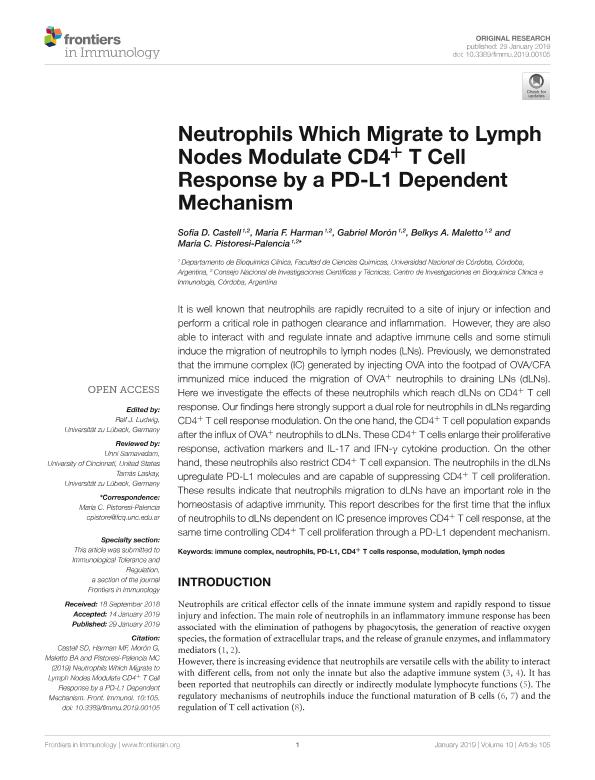Artículo
Neutrophils which migrate to lymph nodes modulate CD4+ T cell response by a PD-L1 dependent mechanism
Castell, Sofía Daiana ; Harman, María Florencia
; Harman, María Florencia ; Morón, Sergio Gabriel; Maletto, Belkys Angélica
; Morón, Sergio Gabriel; Maletto, Belkys Angélica ; Pistoresi Palencia, María C.
; Pistoresi Palencia, María C.
 ; Harman, María Florencia
; Harman, María Florencia ; Morón, Sergio Gabriel; Maletto, Belkys Angélica
; Morón, Sergio Gabriel; Maletto, Belkys Angélica ; Pistoresi Palencia, María C.
; Pistoresi Palencia, María C.
Fecha de publicación:
01/2019
Editorial:
Frontiers Media S.A.
Revista:
Frontiers in Immunology
e-ISSN:
1664-3224
Idioma:
Inglés
Tipo de recurso:
Artículo publicado
Clasificación temática:
Resumen
It is well known that neutrophils are rapidly recruited to a site of injury or infection and perform a critical role in pathogen clearance and inflammation. However, they are also able to interact with and regulate innate and adaptive immune cells and some stimuli induce the migration of neutrophils to lymph nodes (LNs). Previously, we demonstrated that the immune complex (IC) generated by injecting OVA into the footpad of OVA/CFA immunized mice induced the migration of OVA+ neutrophils to draining LNs (dLNs). Here we investigate the effects of these neutrophils which reach dLNs on CD4+ T cell response. Our findings here strongly support a dual role for neutrophils in dLNs regarding CD4+ T cell response modulation. On the one hand, the CD4+ T cell population expands after the influx of OVA+ neutrophils to dLNs. These CD4+ T cells enlarge their proliferative response, activation markers and IL-17 and IFN-γ cytokine production. On the other hand, these neutrophils also restrict CD4+ T cell expansion. The neutrophils in the dLNs upregulate PD-L1 molecules and are capable of suppressing CD4+ T cell proliferation. These results indicate that neutrophils migration to dLNs have an important role in the homeostasis of adaptive immunity. This report describes for the first time that the influx of neutrophils to dLNs dependent on IC presence improves CD4+ T cell response, at the same time controlling CD4+ T cell proliferation through a PD-L1 dependent mechanism.
Palabras clave:
CD4+ T CELLS RESPONSE
,
IMMUNE COMPLEX
,
LYMPH NODES
,
MODULATION
,
NEUTROPHILS
,
PD-L1
Archivos asociados
Licencia
Identificadores
Colecciones
Articulos(CIBICI)
Articulos de CENTRO DE INV.EN BIOQUI.CLINICA E INMUNOLOGIA
Articulos de CENTRO DE INV.EN BIOQUI.CLINICA E INMUNOLOGIA
Citación
Castell, Sofía Daiana; Harman, María Florencia; Morón, Sergio Gabriel; Maletto, Belkys Angélica; Pistoresi Palencia, María C.; Neutrophils which migrate to lymph nodes modulate CD4+ T cell response by a PD-L1 dependent mechanism; Frontiers Media S.A.; Frontiers in Immunology; 10; JAN; 1-2019; 1-13
Compartir
Altmétricas



